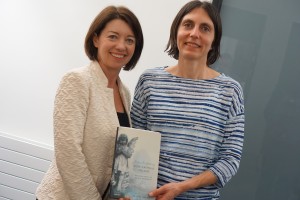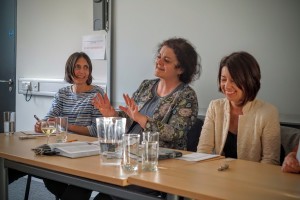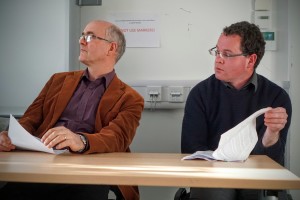 My latest book, Transforming Post-Catholic Ireland: Religious Practice in Late Modernity (Oxford 2016) was launched Tuesday at the Irish School of Ecumenics (ISE), Trinity College Dublin, with an ‘author meets critics’ session.
My latest book, Transforming Post-Catholic Ireland: Religious Practice in Late Modernity (Oxford 2016) was launched Tuesday at the Irish School of Ecumenics (ISE), Trinity College Dublin, with an ‘author meets critics’ session.
Brian Conway (NUI Maynooth), Siobhán Garrigan (Loyola Institute, TCD), and Patrick Mitchel (Belfast Bible College) formed the panel.
The book was the product of an ISE research project, ‘Visioning 21st Century Ecumenism,’ which was funded by the Irish Research Council. The project included theological and sociological analysis. Though I now work at Queen’s, in my former position at the ISE I conducted the sociological research – surveys and interview case studies – on which the book was based. Three research assistants contributed to the sociological data gathering: Richard Carson, Therese Cullen, and Fred Vincent.
The session was chaired by Linda Hogan, Vice Provost of TCD and Professor of Ecumenics. Hogan was the Principal Investigator for the Visioning Ecumenism project.
You can read the first chapter of the book online for free here. There are a limited number of books still available at the special launch price of 38 euros at the Campus Bookshop, University College Dublin.
The three speakers raised key points and questions from their reading of the book, to which I then responded. I include a selected summary of their comments, and my responses, below.
All the speakers referred to my use of the term ‘post-Catholic’ and my development of the concept of ‘extra-institutional religion.’ So before presenting their remarks, it’s worth outlining my definitions of these terms.
 Post-Catholic: This is a descriptive, empirical concept rather than an epochal one – I am not saying that the island of Ireland was once Catholic, and now it is not. Rather, a dominant, traditional form of Irish Catholicism is being displaced. This is the Catholicism that was a defining characteristic of Irish nationalism, that had a ‘monopoly’ on the Irish religious market (at least in the Republic and among the minority Catholic community in Northern Ireland), had a strong relationship with state power, elevated the status of the cleric to extraordinary high levels, and emphasized the evils of sexual sin. Even if Ireland has largely moved beyond this form of Catholicism, the Catholic Church continues to loom large over the whole island. It retains some social and cultural privileges vis-à-vis other expressions of Christianity, other religions, and secularism/atheism. But a post-Catholic Ireland involves a shift in consciousness in which the Catholic Church, as an institution, is no longer held in high esteem by most of the population and can no longer expect to exert a monopoly influence in social and political life. People from a variety of religions, including Catholicism, now often define their faith in opposition or contrast to Catholicism.
Post-Catholic: This is a descriptive, empirical concept rather than an epochal one – I am not saying that the island of Ireland was once Catholic, and now it is not. Rather, a dominant, traditional form of Irish Catholicism is being displaced. This is the Catholicism that was a defining characteristic of Irish nationalism, that had a ‘monopoly’ on the Irish religious market (at least in the Republic and among the minority Catholic community in Northern Ireland), had a strong relationship with state power, elevated the status of the cleric to extraordinary high levels, and emphasized the evils of sexual sin. Even if Ireland has largely moved beyond this form of Catholicism, the Catholic Church continues to loom large over the whole island. It retains some social and cultural privileges vis-à-vis other expressions of Christianity, other religions, and secularism/atheism. But a post-Catholic Ireland involves a shift in consciousness in which the Catholic Church, as an institution, is no longer held in high esteem by most of the population and can no longer expect to exert a monopoly influence in social and political life. People from a variety of religions, including Catholicism, now often define their faith in opposition or contrast to Catholicism.
Extra-institutional religion: These are new religious spaces that are being created (or discovered) within Ireland’s post-Catholic environment, which is simultaneously undergoing secularization and religious diversification. These are spaces where people use various methods and strategies to keep their faith alive, outside or in addition to the institutional Catholic Church. The term extra-institutional is meant to capture how people’s experiences and practices are so often described not only as outside or in addition to the Catholic Church (extra), but also in the Irish Catholic Church’s own terms (institutional).
Brian Conway
Conway is a sociologist of religion who specializes in the sociology of Catholicism in Ireland and comparatively. He concentrated his remarks on methodology, and the case study chapters on Catholic cases.
The third chapter of the book includes the results of surveys of clergy and laity – and Conway rightly pointed out that response rates were quite low among clergy – 18 per cent, and especially low among Catholic clergy – 13.5 per cent. (The Methodists were the most responsive at 32.7 per cent.) This means that the results of the surveys should be considered indicative rather than representative. Conway wondered then if the people who completed the survey are somehow different.
I didn’t take this point up in my response, but one reason for the low response rate among Catholic clergy may be that they were more likely than other denominations to receive the survey in the post, because it was more difficult to find working email addresses for Catholic clergy. The survey could be completed online or via post. The overall response rate for those who were emailed and completed the survey was 21 per cent, while the postal response rate was just 12 per cent. Also, a very high number of clergy respondents identified as evangelical (68 per cent in Northern Ireland and 45 per cent in the Republic, including Catholic clergy) – so survey respondents seem to be disproportionately evangelical, too.
Conway also said he wanted to hear more about extra-institutional religion, and raised a number of questions:
- How does extra-institutional religion’s position on the margins affect its ‘success’ in areas like diversity, ecumenism and reconciliation? (And how might you measure or define success for that matter?)
- How far can extra-institutional forms of religion go in persisting as expressions of faith, or in driving wider changes?
- How might extra-institutional religion operate in other contexts – beyond Ireland?
- How can parish culture enable or constrain extra-institutional religion?
- How does extra-institutional religion impact across different levels of religious commitment? (The participants in the case studies were mostly very committed.)
 I address the first three questions to some extent throughout the book. I argue that extra-institutional religion’s position on the margins gives it some advantages when it comes to driving change – it has more flexibility and is not encumbered by institutional structures. Yet we know that institutions change more readily if people work with them rather than entirely outside them – so the ability of extra-institutional religion to remain in dialogue with institutional religion also is important. Finally, I think that the concept of extra-institutional religion can travel outside Ireland. It may be especially applicable in Europe, where the system of monopoly state churches has a long history. We know from other studies that state churches continue to have some sort of social and cultural influence even in very secular European societies – and that there are vital forms of religious expression on the ‘margins’ in these countries, too. But we could benefit from further comparative research analysing how other groups exist and flourish in the tension that comes from being outside and in addition to once dominant religious institutions.
I address the first three questions to some extent throughout the book. I argue that extra-institutional religion’s position on the margins gives it some advantages when it comes to driving change – it has more flexibility and is not encumbered by institutional structures. Yet we know that institutions change more readily if people work with them rather than entirely outside them – so the ability of extra-institutional religion to remain in dialogue with institutional religion also is important. Finally, I think that the concept of extra-institutional religion can travel outside Ireland. It may be especially applicable in Europe, where the system of monopoly state churches has a long history. We know from other studies that state churches continue to have some sort of social and cultural influence even in very secular European societies – and that there are vital forms of religious expression on the ‘margins’ in these countries, too. But we could benefit from further comparative research analysing how other groups exist and flourish in the tension that comes from being outside and in addition to once dominant religious institutions.
And I think the last two questions are also worthy of further investigation.
Siobhán Garrigan
Garrigan is the Loyola Chair of Catholic Theology and Director of the Loyola Institute at TCD. She commented that ‘Finally, finally, we have a book that allows us to talk about how the Irish church is, as a lived reality.’
As we had hoped in the wider Visioning Ecumenism project, Garrigan confirmed that the book is valuable for theologians. She said:
As a theologian, the sorts of data and analyses presented in this book is gold. For example –
-
They don’t understand their faith primarily in terms of a rigid set of beliefs.
-
They aren’t worried about their kids’ lack of church participation because they see them leading such good lives.
-
They are articulate about the sex abuse crimes and betrayals of the church.
-
They do things outside of church which are faith-related; sometimes lots of things.
-
They disagree with some church teachings and practices, but to varying degrees remain in relation to the church.
But Garrigan also warned that we must be careful that we don’t contrast the current ‘post-Catholic’ moment with a former period ‘in which there was supposedly total, homogenous, acquiesance by the faithful to a particular form of power. … [This] might also even be to re-oppress the individuals of that history, by not accurately remembering them and their protests and their complication, they who the church already once treated badly. I don’t think that’s what this book is doing. But I worry that the post-Catholic moniker can all too easily tend in that direction.’
I am very grateful to Garrigan for making this point. I share her concern that my specific use of the term post-Catholic is understood, and hope this term doesn’t cause people to lose sight of the complexities and complications of earlier periods of Irish religious history.
Finally, Garrigan concluded by noting that the book has a vocational as well as sociological thrust, in that I show a concern to demonstrate to religious practitioners how the insights from the research might benefit their own religious practice. She even asked for an ‘immediate sequel’ that would ‘encourage and guide those among us who might wish to live into a yet more complicated faith.’
Conway’s questions, and Garrigan’s request for more practical applications from the research, indicate that I could indeed write another book! I noted that when writing the case study chapters, I tried to present them in as accessible a way as possible, so that religious practitioners could read them and learn from the examples of good practice in each case. The second to last page of the book features five recommendations for faith-inspired activists seeking to contribute to change – these are included below but explained more fully in the book:
- Work outside traditional religious institutions
- But do not give up on institutional religion
- Particularly on the island of Ireland, do not focus solely on individual reconciliation – lead the way in promoting reconciliation between groups
- Make your case in both secular and religious terms
- Create networks of groups and individuals, drawing on the skills and resources of religious and secular citizens
Patrick Mitchel
Mitchel is principal of Belfast Bible College and previously worked for many years at the Irish Bible Institute in Dublin. He is well-known for his work on evangelicalism.
Mitchel remarked that the analysis in the book ‘rings true’ for the present era on the island. He also said that he appreciated that as much as possible in the book, I tried to let people ‘speak for themselves.’ He noted my contrast between Irish Catholicism, past and present; the way I tried to present the interaction between continuity and discontinuity within Catholicism; and my chronicling of the increased diversity in the island’s religious ‘market.’
He then posed a series of normative questions – asking if my analysis led me to be a ‘sociological optimist’?:
- Is the present religious situation an improvement on the past – especially if extra-institutional religion can contribute in new ways to reconciliation?
- Do you interpret these religious changes in only positive ways? Or are there risks of cultural accommodation and detachment from the demands of community?
- Can extra-institutional religion help us re-imagine church?
I acknowledged that some ‘hard-nosed’ sociologists try to avoid the normative. But in nailing my colours to the mast as an action researcher, who wants my work to benefit or inform participants in some way, it is very difficult to avoid the normative.
I ended up agreeing with his description of me as a ‘sociological optimist’ – not because I want to pass judgement on the past, but because I see a present situation where individuals have the opportunity to be more active and empowered in their faith. With churches on the island no longer bound up to a large extent with political power, there is a great sociological opportunity for religious activists to challenge any religious, social or political powers that may be contributing to injustice. And in my research I found much vitality outside traditional religious institutions. There were people filled with hope because of their faith.
I agree there are risks – too much individualism in religion could eventually slide into a vague meaninglessness. But what’s striking about the extra-institutional spaces is that they did provide community for people, often when people couldn’t find meaningful community in the institutional churches. Still, people should be aware of the risks Mitchel points out.
Finally, I hope that the examples of extra-institutional religion provided in the book can help people re-imagine church, their faith, and the kind of Ireland they want to live in.
Can the author provide separate definitions of ‘Faith’, ‘Belief’, and ‘Religion’, which are often taken as different words for the same thing?
How can ‘extra-institutional religions’ be identified as religions if they don’t have some form of institutional structure?
If each individual finds his/her own concept of Whatever-There-Is (c/f YHWH), he/she may have to search far and wide to find someone else with a comparable concept. Only if he/she lacks confidence in his/her own concept is there any urgency to convert others to that concept, or even to seek others with a comparable concept.
Religion is a-la-carte concept for those who can’t be bothered to find their own concept.
Removing the theological / magical / supernatural element from religion leaves the more important, practical, social element which can be shared by all, of whatever religious persuasion or none.